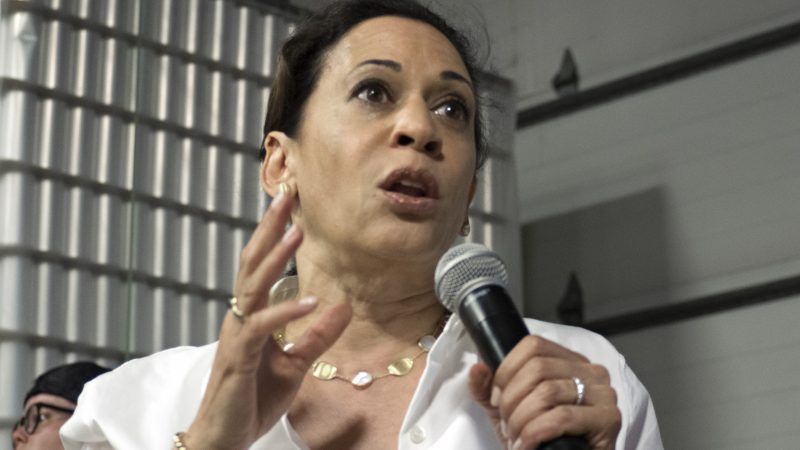Kamala Harris' Plan To End the Racial Homeownership Gap Doubles Down on the Worst Aspects of U.S. Housing Policy
The 2020 contender wants to give $25,000 grants to homebuyers living in historically segregated neighborhoods.

Sen. Kamala Harris (D–Calif.) is out with a new plan to close the gaps in wealth and homeownership between white and minority Americans by subsidizing the down payments of homebuyers living in poorer, historically segregated neighborhoods.
"A typical black family has just $10 of wealth for every $100 held by a white family," Harris said during a Saturday speech announcing her new policy, according to Politico. "We must right that wrong and, after generations of discrimination, give black families a real shot at homeownership—historically one of the most powerful drivers of wealth in our country."
Harris' plan is to create a new $100 billion grant program to be run by the Department of Housing and Urban Development (HUD). This new program will give out as much as $25,000 to individuals making up to $75,000, and families making up to $125,000, which can be used to defray the costs of down payments on homes worth up to $300,000.
Borrowers would still have to prove creditworthiness to obtain a grant, according to Harris' website, although the specific qualifying conditions aren't specified. These grants would only be available to people who have lived in a historically "redlined" community—one that remains low-income—for more than 10 years.
Redlining refers to the federal government's old practice of refusing to guarantee mortgages in predominately black neighborhoods, effectively walling off the people who lived there from New Deal and post-war federal homeownership subsidies.
Racially segregating these subsidies allowed white homeowners to build equity while depriving black families of the same opportunity.
"Although average African-American family incomes today are about 60 percent of average white family incomes, average African-American household wealth is only about 10 percent of average white household wealth. This enormous disparity is almost entirely the result of unconstitutional federal housing policy in the last century, which explains a good part of the racial inequality that we see all around us," wrote Richard Rothstein, author of the Color of Law (a history of these discriminatory housing policies) for Reason in February.
Harris' down payment subsidies are intended to right the wrongs of this policy. Goosing homeownership rates for black and Hispanic families, she claims, will help these same families build wealth.
But by trying to expand homeownership as a means of helping low-income earners build wealth, Harris is doubling down on one of the core contradictions of U.S. housing policy: that homes should be both affordable and a good investment.
A house is only a good tool for accruing wealth if it continues to increase in value over time. As Daniel Hertz at City Observatory notes "this sort of wealth building is predicated on a never-ending stream of new people who are willing and able to pay current home owners increasingly absurd amounts of money for their homes."
This shouldn't happen in a functioning housing market, where a mix of older homes' physical deterioration and the construction of newer housing should see prices decline over time.
The only reason that homes have proven a good investment for many families is because of government restrictions on housing development have prevented new supply from keeping up with additional demand.
The result, in the most restrictive markets, is ever-rising home prices. Some 81 percent of homes in San Francisco are valued at more than $1 million, according to a 2018 study by real estate company Trulia.
That is good for incumbent homeowners. It's bad for everyone else who has to pay more to purchase a home, or is priced out of the housing market altogether. In a country where black and Hispanic people are disproportionally low-income, these restrictions on housing supply take on a racial dynamic.
Harris, rather than try to combat this affordability problem by removing restrictions on supply, wants to subsidize low-income people's ability to get in on this racket. It's a similar approach to her Rent Relief Act, which aims to combat increasingly unaffordable rents by subsidizing tenants' monthly rents.
By subsidizing demand while leaving restrictions on supply in place, both of Harris' policy proposals will likely just lead to increased prices. The value of the subsidies she's offering will be absorbed by home sellers and landlords.
Harris' plan to subsidize down payments has the additional downside of potentially saddling low-income homebuyers with mortgage debt they can't afford, something we saw during the Great Recession.
Research suggests that homeownership is a particularly bad wealth creation tool for low-income buyers. They are more likely to buy at the top of the market—when prices are high but credit standards are looser—and are more easily pushed into default as a result of other financial shocks like job losses or sudden large medical bills.
If Harris wants to decrease the racial gap in homeownership rates, there's a lot of other policies, from getting rid of single-family zoning to abolishing urban growth boundaries, she should endorse that could make that a reality without costing taxpayers a dime.
